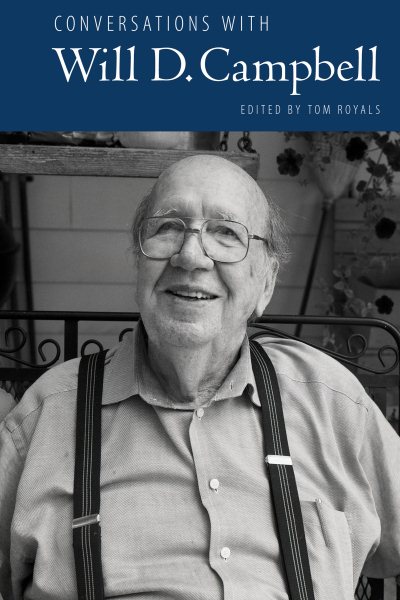By Jim Ewing. Special to the Clarion-Ledger Sunday print edition (April 1)
University Press of Mississippi has produced one its most fascinating books in years with publication of Conversations with Will D. Campbell.
A collection of interviews with Campbell over the course of nearly 40 years, the book edited by retired Jackson lawyer Tom Royals is thought-provoking, humorous, outrageous, and delightful—like Campbell himself.
 Campbell, an Amite County native, died in 2013, but his impact remains. He got his preaching certificate at age 17 at East Fork Baptist Church, and prized it above all his awards and degrees—including one for divinity from Yale.
Campbell, an Amite County native, died in 2013, but his impact remains. He got his preaching certificate at age 17 at East Fork Baptist Church, and prized it above all his awards and degrees—including one for divinity from Yale.
He first distinguished himself as chaplain at the University of Mississippi, 1954-56, leaving after being threatened for his tolerant racial views. He became a staff member of the National Council of Churches and worked closely with such luminaries in the civil rights movement as Rev. Martin Luther King Jr.
Afterwards, he attracted a celebrated following—including much of the country music scene in Nashville—publishing more than a dozen books and writing prolifically in magazines and journals.
Called alternatively a “renegade bootleg preacher” or a preacher without a church, he was reviled and celebrated by both liberals and conservatives—sometimes by both at the same time—immortalized by a cartoon character named Will B. Dunn and dubbed variously the “Aquinas of the Rednecks” and “the conscience of the South.”
As Conversations fleshes out, his theology goes to the heart of Christianity. His was a uniquely Southern Christian spirituality grounded in the Protestant tradition of direct relationship with God and personal connection with Christ. It requires honesty, humility, acts of faith, self-doubt, open-mindedness, and willingness to disobey rules when they conflict with conscience.
He was focused on the miracle of grace, extended to all people, from liberal firebrands to KKK. He believed it was his duty to “witness” to all sinners, which he said, included everyone. He remonstrated his beloved Baptist church for straying from its early roots as a revolutionary pillar of liberty and individual conscience to become a rules purveyor with its own orthodoxies and proscriptions.
Yes, he was an iconoclast, following only what he believed “Mr. Jesus” and his Gospel would approve.
A few nuggets from “Conversations” include:
- Jesus “didn’t say which prisoners to visit—black or white—guilty or not guilty—which sick, which poor to bring good news to, deserving or undeserving.”
- “I believe that our Lord was among the most antireligious ever to come along, for He came breaking the rules, smashing idols, tearing down structures, and proclaiming freedom from all such. And rules, crusades, and structures are the stuff religion is made of, whereas Jesus came proclaiming deliverance.”
- “Love of country is not the same as love for God.”
- “The blacks and whites worshiped together until the Civil War…. (if) the church had managed to stay as a nonracial institution, I think it would have made a great deal of difference.”
- “I never rejected Mississippi.…You can’t grow up in that atmosphere and environment and not, I think, have that as long as you live. Even in your denying of it is affirming it.”
It was my honor to visit with Campbell at his Mt. Juliet, TN, farm shortly after the 1986 publication of his book 40 Acres and a Goat. At the time, I was an editor at the old Jackson Daily News, and we spent an afternoon talking about all things Mississippian. I was in awe.
Reading Conversations is just like sitting on the porch with him.
Jim Ewing, a former writer and editor at the Clarion Ledger, is the author of seven books including his latest, Redefining Manhood: A Guide for Men and Those Who Love Them.


Comments are closed.